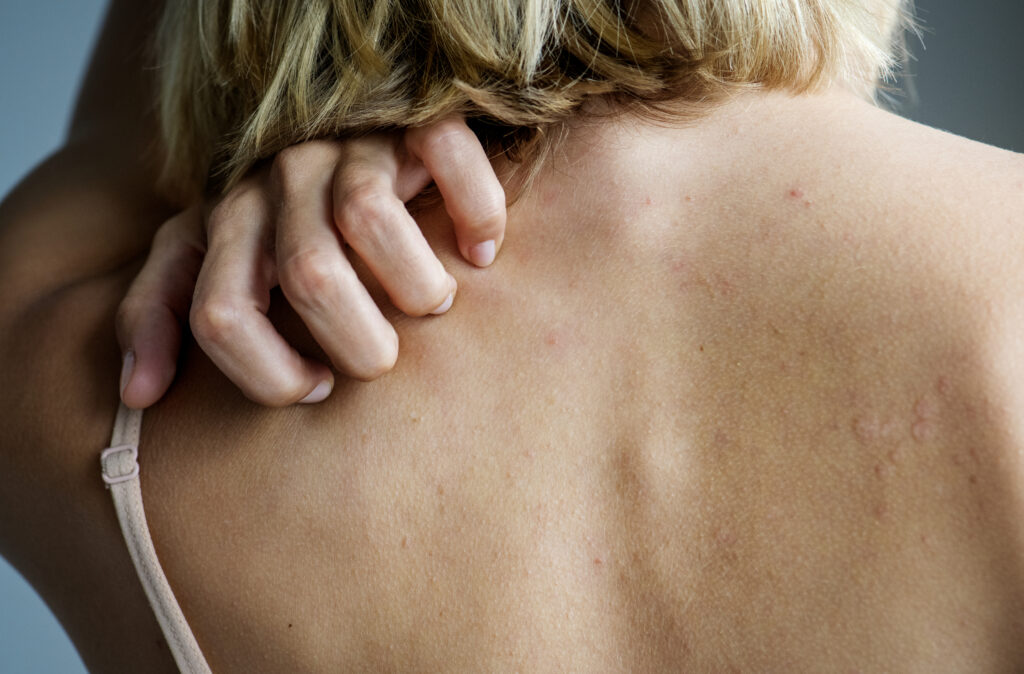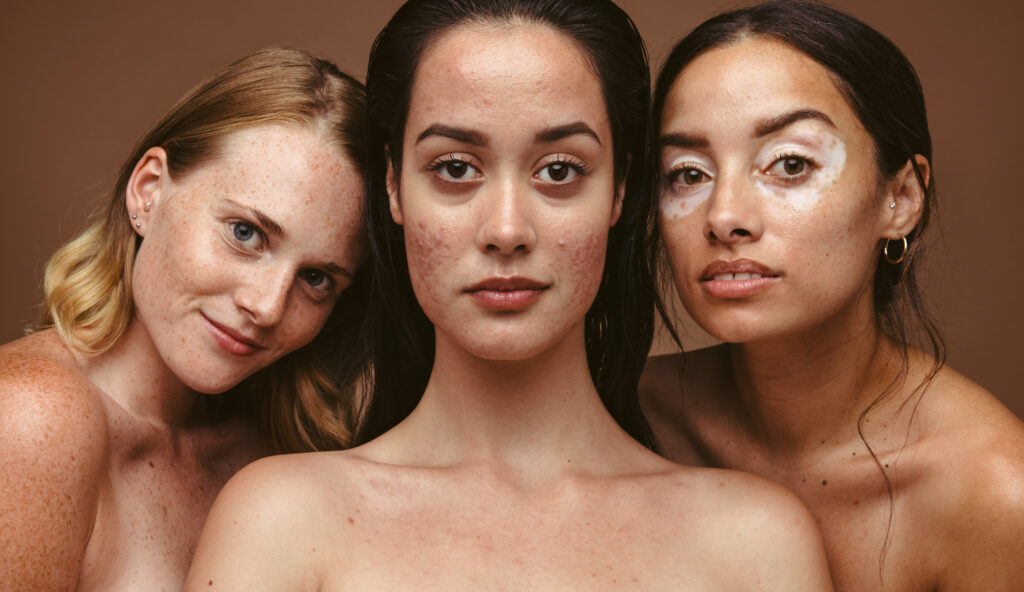Itchy Skin
Do you suffer from itchy skin? If yes, you are far from alone. Itchy skin is a common symptom of many skin conditions and is often accompanied by a rash on the skin.
If you are worried about what is causing your itchy skin or you would like to find out what are the most common rashes on skin, then you have come to the right place.
Read on to discover
- What are the most common symptoms of itchy skin?
- What areas of the body are affected by itchy skin?
- What are the main itchy skin causes?
- How is itchy skin diagnosed?
- What is the best treatment for itchy skin?
- When to see your GP about itchy skin
- What treatments to avoid for itchy skin?
- How to prevent itchy skin
- Itchy skin FAQs
What are the most common symptoms of itchy skin?
As the name suggests, the most common symptom of itchy skin is itching. However, there are several other symptoms that often accompany itching of the skin, including:
- A rash
- Redness
- Bumps, spots, or blisters
- Dry, cracked skin
- Scaly patches on the skin
- Scratch marks on the skin
In some cases, itchy skin can be mild and only last for a short amount of time. However, in others, itchy skin can be severe and long-term. This can result in a vicious itch/scratch cycle that makes the symptoms of itchy skin worse and the duration of the affliction longer.

What areas of the body are affected by itchy skin?
Itchy skin can affect the skin on any area of the face and body. That being said, there are body parts that are more prone to itchy skin and rashes than others. These include:
- Dry, itchy hands
- Dry, itchy legs
- Underarm rashes and itching
- Itchy arms rash
- Rashes on wrist
- Rashes in between legs
- Beard rash
- Itching and rash on elbow crease
- Itching and rash in pubic area
What are the main itchy skin causes?
There are many itchy skin causes, some of which will go away on their own and others that require either over-the-counter treatment or prescribed medications.
The most common itchy skin causes are:
Insect bite
Insect bites such as flea bites can cause very itchy skin. Flea bites typically appear in clusters on the skin and manifest themselves as a red, itchy bump on the skin.
If you have been bitten by an insect, symptoms should appear immediately.
Ringworm
Ringworm is a fungal infection of the skin which typically affects the scalp, feet, hands, nails, groin, and beard. Some of the most common symptoms associated with ringworm are itchy skin, red scaly patches, blisters or pustules, and hair loss.
Contact dermatitis
Contact dermatitis is a skin condition that occurs when your skin experiences an allergic reaction to something it has come into contact with. This could be a skincare product, a cleaning agent, or a plant irritant like poison ivy or poison oak.
The symptoms of contact dermatitis include itchy skin, red scaly skin, blisters that may weep or become crusty and visible borders. Contact dermatitis typically appears within hours or sometimes days after contact with an allergen or irritant.
Allergic eczema
Allergic eczema occurs when your body comes into contact with something that could potentially make you ill.
The most common symptoms associated with allergic eczema are itchy skin, red scaly skin, and blisters that may weep or become crusty. In many cases, allergic eczema looks similar to a burn on the skin.
Nappy rash
Nappy rash is a type of skin irritation that mostly affects babies, although adult nappy rash can occur.
The most prevalent signs of nappy rash are itchy skin, skin that looks red, wet, and irritated, and skin that is warm to the touch. Nappy rash can be found on areas of the body that have contact with a nappy such as the groin, buttocks, and inner thighs.
Atopic dermatitis (Atopic eczema)
Atopic eczema, also known as atopic dermatitis, is one of the most common skin conditions. Typically developing in early childhood, eczema can continue into adulthood.
Some of the most common symptoms of atopic dermatitis are itchy skin, red skin, scaly patches on the skin, a rash, and hair loss where a rash occurs.

Psoriasis
Psoriasis is another common skin condition that affects up to 1.8 million people. Psoriasis can be recognised by scaly, silvery patches on the skin and itchy skin.
This skin condition most commonly affects the scalp, elbows, knees, and lower back.
Shingles
Shingles is an infection that is caused by the same virus as chickenpox. Also referred to as herpes zoster, shingles are often characterised by a red rash that can cause itching, burning, and pain.
Typically, a shingles rash appears in clusters of fluid-filled blisters that may weep if broken. You may also experience a high temperature, chills, a headache and/or fatigue.
Hormonal changes
Itchy skin is a common symptom in pregnancy. This occurs due to the hormonal changes that are going on in your body. Hormonal itching can also occur before, during, and after the menopause.
Shaving
Underarm rashes, a reddish rash on face, beard rash, and a rash on bikini line can all be caused by shaving. In fact, many women notice that their legs itch after shaving. This is particularly prevalent if you experience ingrown hairs.
To avoid itchy skin caused by shaving, make sure that you always apply a moisturising shaving cream or foam before you shave and ensure that you shave against the grain. An armpit rash from deodorant is also common in people who shave their armpits.
Sunburn
Sunburn is a common itchy skin cause that occurs when the skin has been exposed to the harmful rays of the sun for too long.
Rashes from sunburn are typically itchy, red, and inflamed. It can also cause a heat rash on the face and body. In severe cases of sunburn, you may develop a blister heat rash.
Sweating
Excessive sweating or perspiration can cause itchy skin. This is most common under the armpits as well as in around your intimate areas.
Itchy skin due to sweating is more common in overweight and obese people due to a rash in skin folds or a friction rash.
Dry or sensitive skin
If you have dry, very dry, or sensitive skin, you are much more likely to experience itchy skin, especially during the winter months. This is because cold, dry weather can dehydrate the skin, leading to itching in winter.
Serious diseases
In rare cases, prolonged itchy skin can be a sign of a more serious health problem such as blood disease, diabetes, kidney disease, liver disease, HIV, or an overactive thyroid gland.
If you suspect that your itchy skin could be caused by one of the above health conditions, make an appointment with your GP as soon as possible.
Skin cancer
Itchy skin can be a sign of skin cancer, although this is rare. Most commonly, skin cancer will manifest itself as a single spot on the skin that may be itchy.
If you notice a new spot on your skin or a change in the appearance of a mole, then make an appointment with your GP as soon as possible.
How is itchy skin diagnosed?
To determine what type of treatment you need for your itchy skin, you first need to find out what has caused the irritation.
Some itchy skin causes are easy to diagnose, such as an insect bite or an allergen, whereas others, such as eczema and psoriasis, may require a professional diagnosis.
If you are not sure what has caused your itchy skin, it can be a good idea to make an appointment with your GP or a dermatologist.
In most cases of itchy skin, your GP will be able to diagnose your condition simply by examining your skin and asking you about your symptoms and medical history. However, in some cases, a blood test, skin swab, or skin biopsy may be needed.
What is the best treatment for itchy skin?
The treatment that you need for your itchy skin will be dependent on the cause of the irritation.
Look for a moisturiser or emollient that has been specially formulated for dry or sensitive skin. If your have dry and very skin, a skin barrier ointment such as Locobase Protect and Locobase Repair is highly effective at locking in moisture and preventing cracked skin.
The symptoms of mild and moderate atopic edermatitis such as drynes, redness and itching can be treated with the, a high-quality and high-effective cortison free moisturiser Locobase Eczema Cream, a medical device for topical use..
If you suffer from dry and itchy skin on your feet, then an exfoliation socks such as Footner can help to remove dead skin cells and leave your feet feeling soft, smooth, and itch-free. These can be bought online or at most pharmacies.
Light therapy, also known as phototherapy, is a good option for people who struggle with oral medications but suffer from severe itchy skin.

When to see your GP about itchy skin
In most cases, itchy skin can be treated without the need for a visit to your doctor or GP. However, if you are experiencing any of the below symptoms, you should seek medical advice:
- Itchy, sore, or inflamed skin that is affecting your daily life
- Signs of an infection such as oozing blisters or pus
- Prolonged itchy skin that is not responding to treatment
What treatments to avoid for itchy skin?
There are certain treatments and home remedies that should be avoided on itchy skin, especially if you do not yet know the cause of your itching.
These include:
- Aloe vera gel as this is often fragranced, which can irritate the skin
- Apple cider vinegar as this is acidic and can make the skin burn or sting
- Scented moisturisers
How to prevent itchy skin
To prevent itchy skin, there are several practices that you can adopt, including:
- Avoid products or situations that cause your itchy skin
- Moisturise daily with a fragrance-free and hypoallergenic cream
- Treat an itchy scalp with a medicated shampoo
- Reduce your stress levels
- Try over-the-counter allergy medicine
- Use a humidifier
- Apply cooling gels to the skin
- Avoid scratching
- Take lukewarm baths and avoid hot baths or showers
- Get sufficient sleep
Itchy skin FAQs
What deficiency causes skin itching?
A vitamin D deficiency can cause dry and itchy skin. If your vitamin D levels are low, you should take a daily vitamin D supplement and try to get some sunlight on your skin each day. Vitamin D is also good for reducing skin rashes.
Can Covid cause itching?
One of the lesser-known symptoms of Covid is a rash that is intensely itchy. Typically, this rash affects the fingers and toes, but it can also occur on the tongue. Although it is not clear why this happens, it is thought that it may be related to how the immune system responds to the virus.
How can I stop itching all over my body?
The quickest way to stop itching all over your body is to take a lukewarm bath. Do not add any scented bath products or use any soaps. Soak for 10-15 minutes and while your skin is still damp, apply a moisturiser all over your body. Do not rub your skin with a towel. Instead, allow your body to air dry or gently pat your skin with a soft towel.
What can cause itching all over the body without a rash?
There are several possible itchy skin causes when it comes to itching all over the body, including an allergic reaction, flea bites, and an underlying health condition such as kidney disease, diabetes, or anaemia. If your all-over-body itching continues for more than a few days, book an appointment with your doctor.
What foods cause itching?
Certain foods are known for causing itchy skin, including eggs, soy, wheat, peanuts, shellfish, and cow’s milk. If you think your itching is caused by a food allergy, it can be a good idea to start a food diary.
How to stop my feet from itching?
You can treat dry and itchy feet by using an exfoliation treatment such as Footner Exfoliation Socks and a thick moisturiser that is specially formulated to hydrate and nourish the skin on your feet.
No products found